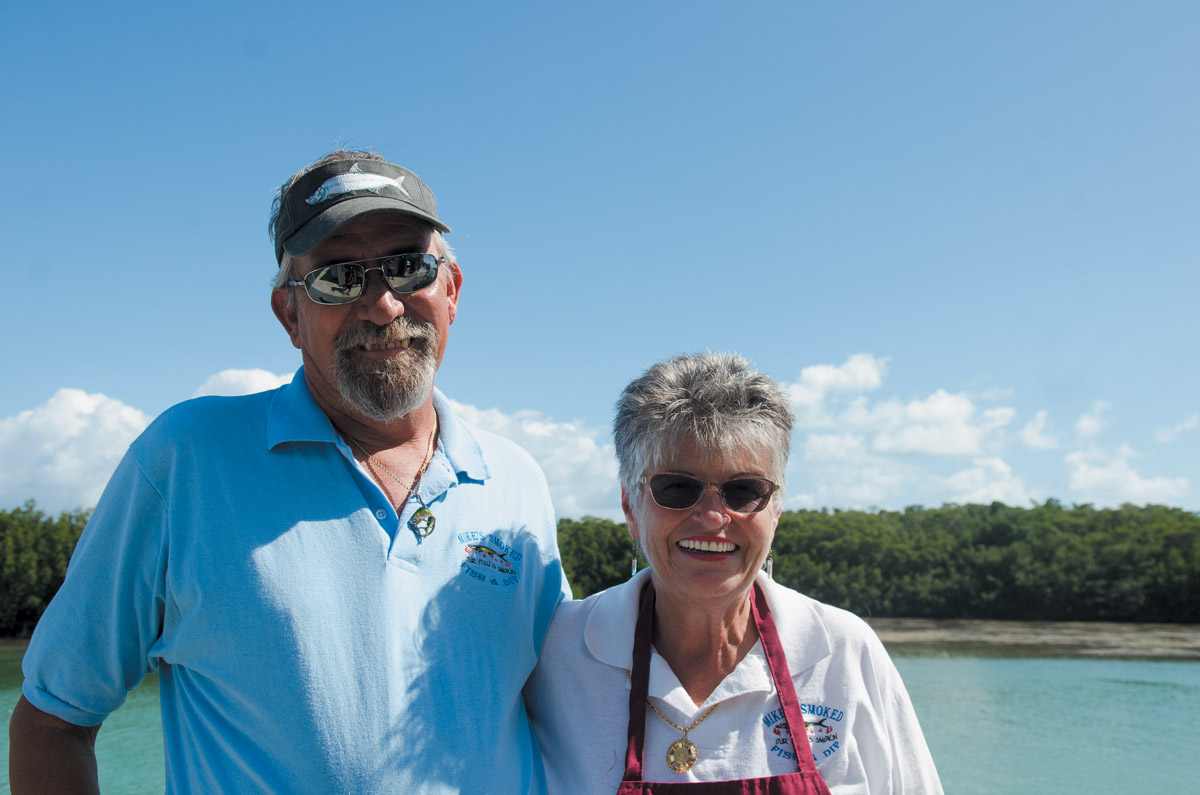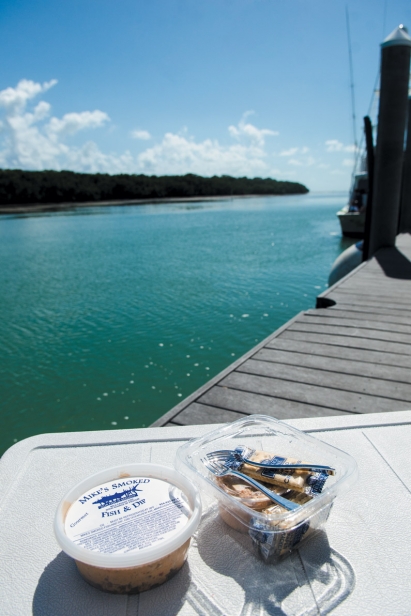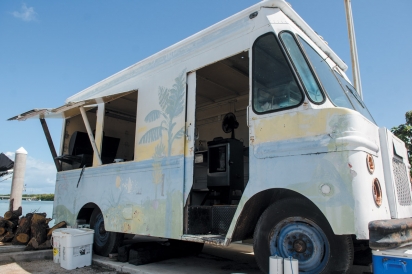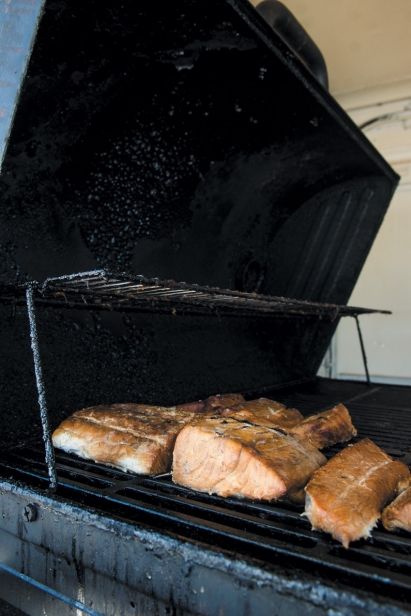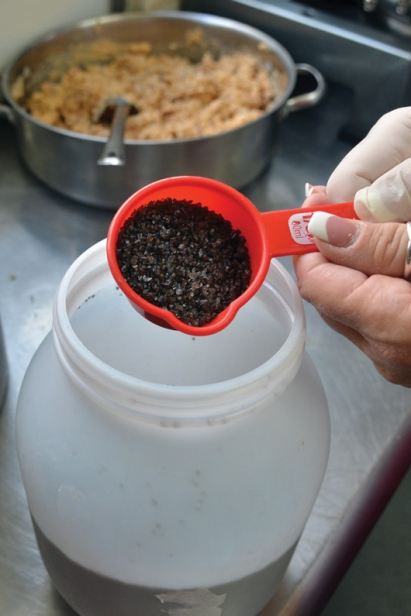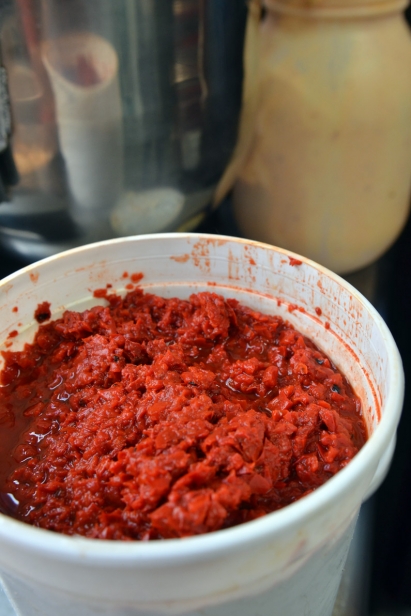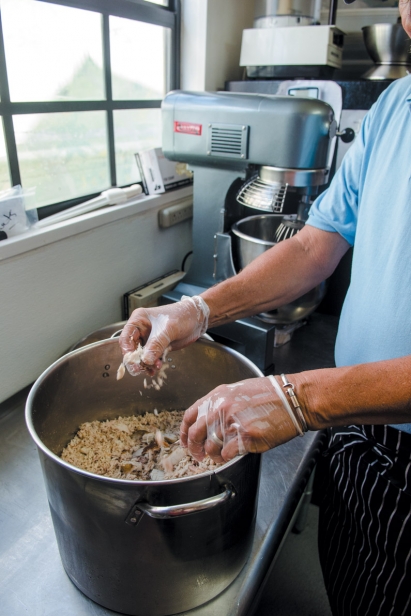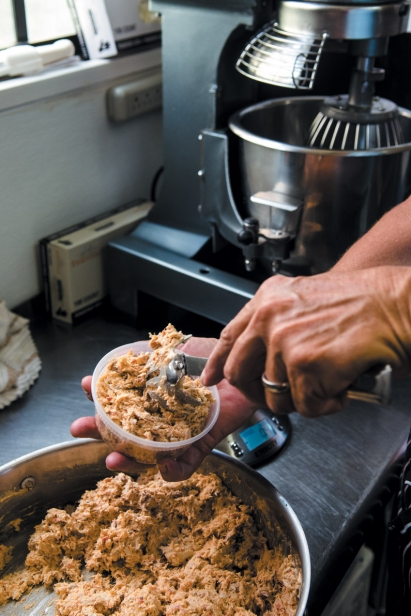Capturing the Taste of the Keys
When it’s time to go to work at Mike’s Smoked Fish and Dip, Mike and Debora Jennings only need to walk from their home on a boat to their kitchen at Pancho’s Fuel Dock at Boot Key Harbor. Along the way, they might spot a manatee or jellyfish in the waters. Outside their doorway, fishing boats loaded with lobster traps head out to sea. It’s the perfect snapshot of the Florida Keys.
Their fish dip business came about not because of a need to share a secret family recipe. Instead, it was a crop of half-dead poinsettia plants one Christmas that inspired their business. “We always gave poinsettias as gifts at the marina,” says Mike. But they were in such bad condition that season that they decided to give away homemade fish dip instead. Never mind that they had never made it before. But the pair did have work experience in the food industry as well as a love of cooking.
Before they met and married in Fort Lauderdale, Mike, from Oxnard, California, had served in the Navy and worked as a cook. After jobs in drywall and construction, he got his captain’s license and worked as a charter captain, coming back with a lot of kingfish. Debbie, from Brooklyn, had worked in restaurants since she was young.
Starting Small
Mike bought a smoker and started smoking fish. Then they worked on the fish dip recipe. They sampled fish dips throughout the Keys and discovered what they liked and didn’t like. While the basic ingredients – fish, mayo, onion, cream cheese – are similar, the consistency is not. To Mike, getting the right texture by breaking the smoked fish in chunks was essential, even if it was more labor-intensive. “I knew I wasn’t going to grind up the fish, or cut it,” he says. He didn’t want to use preservatives, either. “No liquid smoke or MSG.”
Friends and neighbors liked the results. The next phase, selling the dip wholesale, meant they had to get legal, by setting up a commercial kitchen and complying with FDA regulations. Debbie took care of the latter by going back to school, learning the rules about fish as well as food safety processes.
“This was the hardest part – I had to write a HACCP plan describing every step from receiving the fish to the time the consumer gets it,” she says. Meanwhile, Mike was setting up their commercial kitchen and smokehouse. They were able to convert a 12x12 storage shed into a commercial kitchen, equipping it with refrigerators, a commercial mixer and racks of lids, labels and containers. The smokehouse had to be enclosed. The Jennings discovered an old food truck filled with tires and had it towed in behind the kitchen. A sink was added as well as several smokers.
Mike’s Smoked Fish and Dip got its license in November 2016 and started selling at farmers markets and grocery stores in the lower Keys. Scaling up production presented some challenges. “There was a learning curve on the smoking, going from five pounds of fish a week to 50,” Mike says. He had to modify his smokers to fit the additional fish. And getting a steady supply of wild-caught kingfish, amberjack, Spanish mackerel and wahoo from local fishermen remains an ongoing issue.
At the Markets
Getting feedback from customers at the farmers markets gave them the encouragement they needed. Like many market vendors, the Jennings offer samples to entice customers to buy.
“Once they know what it is, they return for more,” says Debbie. They’ve already been approached to expand their distribution, but at the moment, their plans are to keep Mike’s Smoked Fish and Dip just in South Florida. That little kitchen on the water where the dolphins play can only handle so much fish dip – and right now, that’s just where they want to be.
Smokin’
Mike Jennings starts the process in his smokehouse, a modified food truck, by brining slabs of kingfish, amberjack, Spanish mackerel or wahoo – all oily fish that work best for smoking – caught by local fishermen. The brine uses smoked salt and turbinado sugar, which adds a light molasses flavor. After two days in the brine, he takes out the spine and bloodline and places the slabs in the smokers. For smoking, Jennings uses local buttonwood, a native hardwood related to mangroves used for charcoal, that he gets from licensed suppliers. The slabs are smoked at a low temperature for five hours. Then he cranks up the heat to bring the temp up to 168 degrees for at least 30 minutes. In another smoker, red bell peppers are roasted. Some of the fish slabs are packaged in pieces sold as smoked fish.
For the dip, Jennings breaks the fish by hand into flakes and chunks, a step he believes gives his fish dip a different texture compared to smoother fish dips. He combines the fish with a mixture that includes cream cheese, mayonnaise, sour cream, red onions, fresh garlic, horseradish, Worcestershire sauce, lemon juice, and a puree made from the roasted red peppers. His preferred tool is a metal spaghetti serving spoon. The dip is then packed in plastic tubs and labeled for the markets or grocery stores.
Before every market, Mike and Debbie pack the dip in containers, which go into ice in large coolers. The dip is sold in one-pound containers, half-pound ($9) and a grab-and-go container packed with crackers and a fork.
Mike’s Smoked Fish and Dip
Boot Key Harbor, Marathon
Buy at farmers markets in the Keys (some are open seasonally, so check first): Key West Bayview Park; Key West Artisan Market; Islamorada; Key Colony; Sugarloaf Lodge and Key Colony Beach; and seafood festivals. Also find at Fausto’s in Key West, Marathon Liquor and Deli, Pancho’s Fuel Dock in Marathon, the Trading Post in Islamorada; and Islamorada Beer Company.


